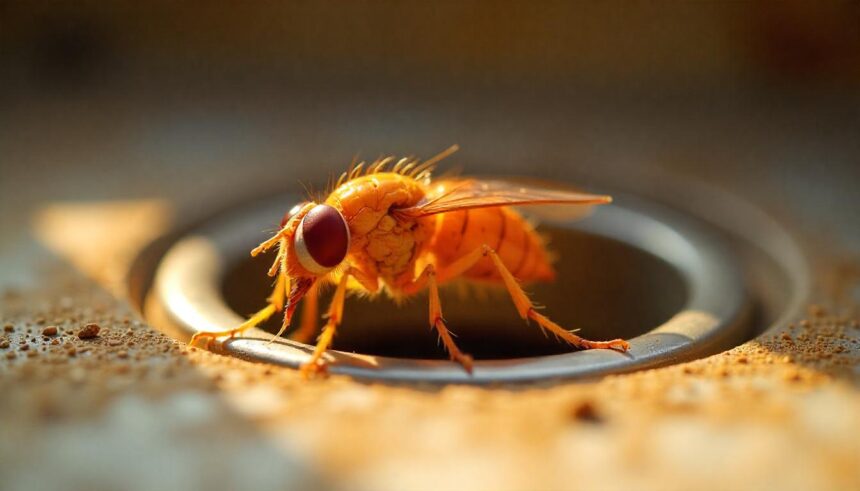Drain flies, also known as moth flies or sewer gnats, are small, fuzzy insects that thrive in the moist, organic buildup inside drains. Though they don’t bite or spread diseases directly, their presence can be a nuisance and an indication of underlying hygiene issues. Fortunately, you can eliminate them using a combination of natural and chemical methods while also implementing preventive measures to keep them from returning.
Understanding Drain Flies and Their Causes
Drain flies breed in stagnant water and organic matter that accumulates inside drains, garbage disposals, and even moist areas like mop buckets or leaky pipes. They thrive in dark, damp environments with decaying debris, such as food particles, grease, and soap scum.
Common Causes of Drain Flies
- Clogged or dirty drains – Organic buildup provides an ideal breeding ground.
- Standing water – Leaky pipes, slow-draining sinks, or unused drains allow them to thrive.
- Garbage disposals – Food residue inside disposals can attract drain flies.
- Sewer leaks – A cracked or damaged sewer line can create breeding spots.
- Overwatered plants – Excess moisture in plant soil can be an unexpected source.
How to Get Rid of Drain Flies Naturally
If you prefer eco-friendly, non-toxic solutions, these natural methods effectively eliminate drain flies without harsh chemicals.
1. Boiling Water Flush
Pouring boiling water down the drain daily for a few days can kill larvae and dislodge organic matter.
2. Baking Soda and Vinegar Treatment
- Pour ½ cup of baking soda down the drain.
- Follow with 1 cup of vinegar.
- Let it sit for 15-30 minutes before rinsing with hot water to break down residue and kill fly eggs.
3. Salt and Baking Soda Mix
- Mix ½ cup of salt, ½ cup of baking soda, and 1 cup of vinegar.
- Pour the mixture into the drain overnight.
- Flush with boiling water in the morning.
4. Apple Cider Vinegar Trap
- Fill a bowl with apple cider vinegar and a few drops of dish soap.
- Cover with plastic wrap and poke small holes.
- Place it near the infested area to attract and trap adult flies.
Chemical Solutions for Stubborn Infestations
If natural remedies don’t resolve the problem, chemical treatments can provide faster results.
1. Commercial Drain Cleaners
- Use enzyme-based drain cleaners to break down organic matter without harsh chemicals.
- Avoid bleach, as it may not fully remove the organic buildup and could damage pipes.
2. Insect Growth Regulators (IGRs)
- These products interrupt the fly life cycle, preventing larvae from maturing into adults.
3. Aerosol Sprays or Residual Insecticides
- Use pyrethrin-based sprays to kill adult drain flies instantly.
- Apply insecticide foam inside drains to eliminate hidden larvae.
Preventive Strategies to Keep Drain Flies Away
Once you’ve eradicated drain flies, follow these expert-recommended maintenance tips to prevent reinfestation.
1. Regular Drain Cleaning Routine
- Pour boiling water down drains weekly.
- Use a drain brush or plumber’s snake to scrub away buildup.
- Flush drains with vinegar and baking soda monthly.
2. Fix Plumbing Issues
- Repair leaky pipes and faucets to eliminate excess moisture.
- Unclog slow-draining sinks to prevent standing water.
3. Maintain a Clean Kitchen and Bathroom
- Avoid leaving food scraps or grease in the sink.
- Keep garbage disposals clean by running citrus peels or baking soda through them.
- Wipe up spills and moisture around sinks and tubs.
4. Use Drain Covers
- Install mesh drain covers to prevent organic matter from accumulating.
- Clean and disinfect drain stoppers regularly.
5. Monitor Unused Drains
- If a sink, shower, or floor drain isn’t used often, run water through it weekly to prevent stagnant water buildup.
When to Call a Professional
If drain flies persist despite your best efforts, or if you suspect a sewer line issue, it may be time to consult a plumber. Professionals can use specialized tools, such as drain cameras and industrial cleaners, to tackle severe infestations at the source.
Final Thoughts
Drain flies are a frustrating but manageable problem for homeowners. By addressing the root cause, using natural or chemical treatments, and following preventive maintenance, you can keep your home free of these pesky pests. A little regular upkeep goes a long way in ensuring a clean, fly-free environment!







